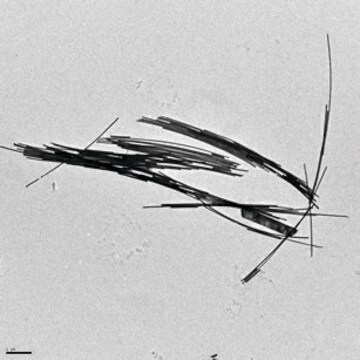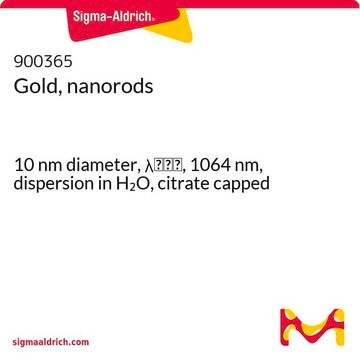716812
Gold nanorods
10 nm diameter, λmax, 780 nm, dispersion in H2O
Synonym(s):
Au nanorods, Gold nanorod
About This Item
Recommended Products
form
colloidal suspension
dispersion in H2O
nanorod
Quality Level
contains
CTAB as stabilizer
concentration
>30 μg/mL in H2O
diam. × L
10 nm × 38 nm , ±10%
impurities
<0.1% CTAB
<0.1% ascorbic acid
diameter
10 nm
pH
3-5
density
1.00 g/mL at 25 °C
λmax
780 nm
Mw/Mn
(<10% CV, monodispersity)
>95 (rods)
storage temp.
2-8°C
SMILES string
[Au]
InChI
1S/Au
InChI key
PCHJSUWPFVWCPO-UHFFFAOYSA-N
Looking for similar products? Visit Product Comparison Guide
Application
- Zinc standard for biochemical research: A study in Micromachines reported the development of a novel thin-layer flow cell sensor system that utilizes a zinc standard solution for heavy metal ion detection. This application highlights the utility of high-purity zinc standards in enhancing the sensitivity and specificity of biochemical assays, particularly in environmental monitoring and public health sectors (Xiao et al., 2024).
Physical properties
Legal Information
Hazard Statements
Precautionary Statements
Hazard Classifications
Aquatic Chronic 3
Storage Class Code
12 - Non Combustible Liquids
WGK
WGK 3
Flash Point(F)
Not applicable
Flash Point(C)
Not applicable
Regulatory Listings
Regulatory Listings are mainly provided for chemical products. Only limited information can be provided here for non-chemical products. No entry means none of the components are listed. It is the user’s obligation to ensure the safe and legal use of the product.
JAN Code
716812-VAR:
716812-BULK:
716812-25ML:
Choose from one of the most recent versions:
Already Own This Product?
Find documentation for the products that you have recently purchased in the Document Library.
Customers Also Viewed
Articles
Gold nanostructures such as nanorods, nanowires and microgold have found applications in exciting fields such as biomedical engineering, catalysis and diagnostics.
Single molecule electronics is the endeavour of constructing electronic circuitry with single molecules as the fundamental building block.
Silver nanomaterials have unique physical, chemical, and optical properties that are currently being leveraged for a wide variety of biological applications.
Among various ceramics, one-dimensional (1-D) piezoelectric ceramics have attracted significant scientific attention for use in energy harvesting.
Our team of scientists has experience in all areas of research including Life Science, Material Science, Chemical Synthesis, Chromatography, Analytical and many others.
Contact Technical Service


